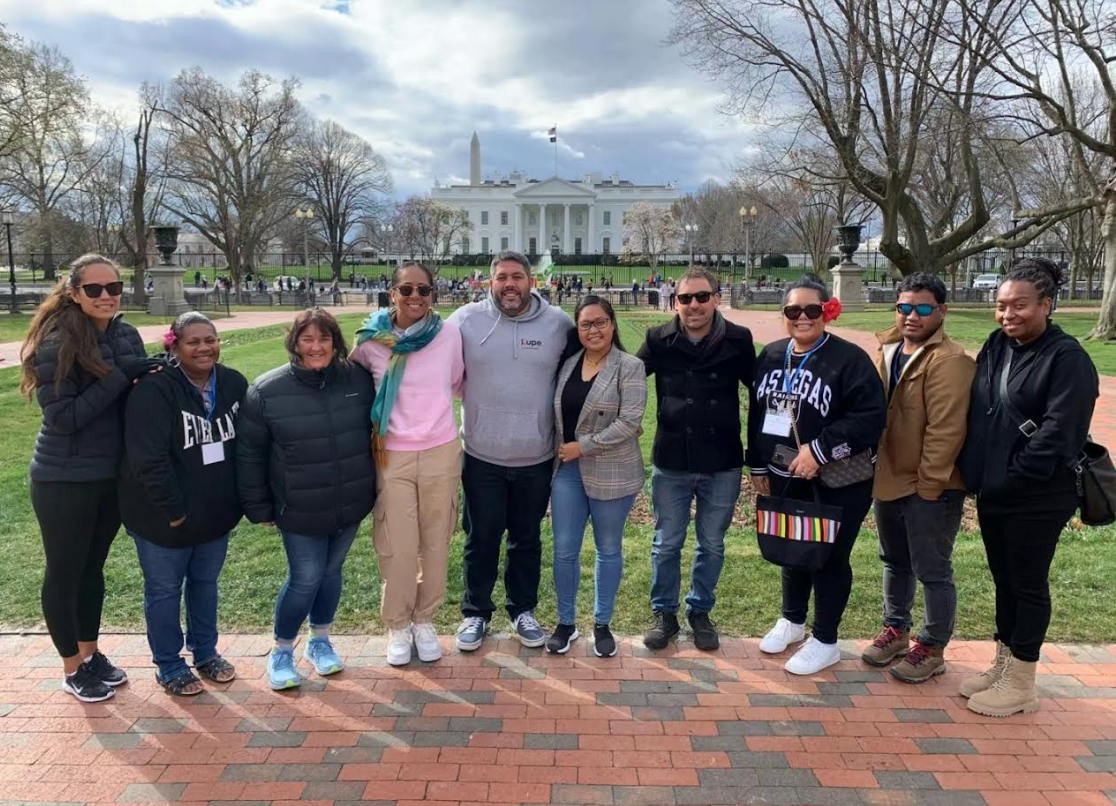Te Ipukarea Society: Cook Islanders gain insights on sustainable Blue Economy practices in US
Saturday 6 April 2024 | Written by Te Ipukarea Society | Published in Environment, National

The ‘Blue Economy’ themed programme included two representatives from the Cook Islands, Alanna Smith from Te Ipukarea Society, left, and Rima Browne from the Seabed Minerals Authority, fourth from left. TIS/24040529
The International Visitors Leaders Programme (IVLP) funded by the U.S State Department nominated 10 representatives from the Pacific who work within the ‘Blue Economy’ to participate in a three-week long knowledge exchange programme in the United States.
The ‘Blue Economy’ themed programme included two representatives from the Cook Islands, Alanna Smith from Te Ipukarea Society and Rima Browne from the Seabed Minerals Authority. Other Pacific representatives included government and non-government representatives from Samoa, Marshall Islands, Palau, New Zealand, Vanuatu, and Papua New Guinea.
The ‘Blue Economy’ looks at how marine resources are managed both profitably and sustainably. Because the IVL Programme was marine-themed, a range of major cities were visited including the capital Washington D.C, Jacksonville in Florida, Portland in Maine, Boston in Massachusetts, Monterey and San Francisco in California.
Sites that were of interest included Jacksonville Port Authority (JAXPORT) on the East Coast of the United States. JAXPORT is Florida’s largest container port and one of the nation’s largest vehicle-handling ports. JAXPORT was fascinating in that it operated with three electric cranes used to lift containers on and off cargo boats. A substation with power cables plugged into the cranes powers the crane to lift containers. The lowering of the containers creates energy like how electric vehicles generate power going downhill.
Portland Maine was another favourite state amongst the Pacific group to not only try their iconic lobster but to also learn about how the lobster industry has managed to support nearly 18,000 jobs and generate around USD$500 million (NZ$831.5m) in revenue. Because the fishery has been passed on from generation to generation it has become well-regulated by having ‘fishermen watch groups’ ensuring other fishermen on the water are not breaking rules or regulations. If rules are broken, hefty penalties come into play like losing your fishing licence which means an instant loss of income. Local research institutes like the University of Maine, Coastal Studies Center and Bowdoin College were also visited. These research institutes talked about their role in informing management decisions for the lobster fishery by collecting environmental data to predict possible changes in water quality and temperature which may shift lobster populations outside current licenced areas.
Back on the Pacific Ocean side, the West Coast Middlebury Institute of International Studies in Monterey Bay was most interesting in that they talked about ‘Ecosystem Services’ and putting a value on natural services provided by the environment. For example, what our wetlands naturally do for our inhabited communities acting as a sponge during high rainfall and filtering out pollutants before entering the ocean/lagoon. These intrinsic values have been used to prevent certain developments within the Monterey Area. For example, the widening of a road in a large wetland site was prohibited.
Monterey Bay Aquarium Research Institute (MBARI) based in San Francisco was beneficial for the Cook Islands representatives as researchers here worked closely in deep-sea environmental studies. MBARI is a private nonprofit institute, that does not lobby the U.S Government but provides all collected data and information online through its webpage so others can use their data to lobby the government. MBARI, which the PACKARD Foundation funds, develops its own deep sea surveying technology. These include Remotely Operated Vehicles (ROVs) that can go 3000 metres deep and software systems that can process and manage thousands of underwater photos and videos of deep sea species. Deep sea sound science and the technologies used to understand the behaviours of whales were also discussed as well as the potential impacts offshore development may have on these migratory species.
Having completed the programme, the Pacific participants were left with a broad understanding of the varying roles government, non-government organisations and the private sector play in the United States Blue Economy space. Partnerships amongst all key stakeholders were raised constantly in all meetings held to help guide how the Blue Economy is managed. Having strict enforcement in place i.e. fines or penalties on marine-based activities was also regularly brought up to ensure the sustainability of the States’ Blue Economy is achieved.














































